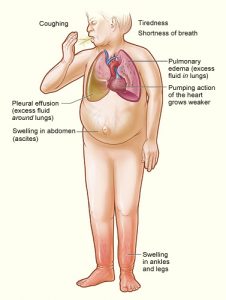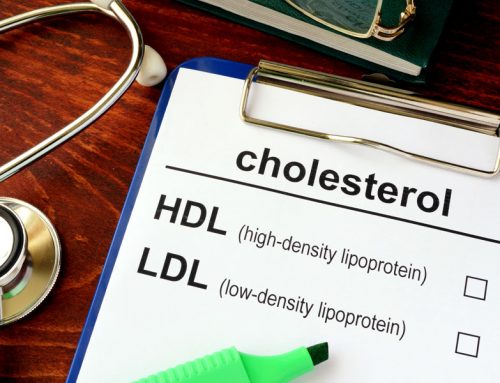
Chronic heart failure is characterized by an energy starved heart. The Q-Symbio study’s lead researcher, Dr. Svend Aage Mortensen, treated chronic heart failure patients with 300 milligrams of Coenzyme Q10 daily as an adjunctive treatment to the conventional heart failure medications. His thinking was that the conventional treatments block rather enhance cellular processes and do not address the heart muscle cells’ need for the cofactor Coenzyme Q10 in the ATP energy production process. He used Coenzyme Q10 supplements to address the dysfunction of cellular bio-energetics that is associated with heart failure.
When looking at Coenzyme Q10 as heart failure medicine, the Q-Symbio randomized, double-blind, controlled study of the effect of Coenzyme Q10 supplementation on morbidity and mortality in heart failure shows that adjuvant supplementation of heart failure patients with 300 milligrams of Coenzyme Q10 daily reduces the all-cause risk of death by half [Mortensen 2014]. The 300-milligram dosage was administered in 100-milligram increments three times a day, always with meals. Dr. Svend Aage Mortensen, the lead researcher on the Q-Symbio study, recommended that daily administration of Coenzyme Q10 should become a component of the standard treatment of heart failure [Mortensen 2015].
Dr. Mortensen’s recommendation is based on the following points:
- Coenzyme Q10 is a naturally produced substance in the body that is essential to our survival. It acts both as a vital co-factor in the process of ATP energy production and as an important fat-soluble antioxidant [Littarru 1994].
- The body’s production of Coenzyme Q10 decreases with increasing age after we become adults [Kalén]. It is not possible to make up the deficit of Coenzyme Q10 by eating more carefully [Judy 2017].
- Moreover, treatment of with statin medications to inhibit the body’s production of cholesterol also inhibits the body’s synthesis of Coenzyme Q10 [Okuyama 2015].
- Coenzyme Q10 concentrations are known to be reduced in the blood and heart muscle tissue of heart failure patients [Folkers 1985]. The worse the stage of the heart failure, the more pronounced is the observed lowered concentration of Coenzyme Q10 in the patients’ blood and tissue [Folkers 1985].
- Meta-analyses of randomized controlled studies of Coenzyme Q10 supplementation of heart failure patients have shown that the Coenzyme Q10 supplementation, compared to placebo supplementation, significantly improves the symptoms, the functional capacity, and the quality of life of heart failure patients [Soya; Sanders; Fotino; Lei].
- Coenzyme Q10 administration is the first new development in the treatment of heart failure to improve survival rates since the introduction of ACE inhibitors and beta-blockers [Mortensen 2015].
- Coenzyme Q10 administration is a positive heart failure medication. Coenzyme Q10 works by enhancing the body’s cellular processes rather than by blocking cellular processes [Mortensen 2015]. Coenzyme Q10 improves the heart muscle’s energy production and the heart muscle’s antioxidant protection.
- Coenzyme Q10 administration is a natural and safe medication that corrects a deficiency that is closely associated with the risk of heart failure. Coenzyme Q10 administration helps to correct the chronic heart failure syndrome known as “the energy starved heart” [Mortensen 2003].
- Coenzyme Q10 supplements are currently sold over-the-counter in the United States. In at least one country of the European Union – Hungary – the medical authorities have already approved Coenzyme Q10 administration as a medicine for heart failure patients [Bio-Quinone].
Documentation of Coenzyme Q10 efficacy from the Q-Symbio study
The Q-Symbio study enrolled 420 patients with severe heart failure. In addition to their conventional heart failure medicine, the patients received either 300 milligrams of Coenzyme Q10 or a matching placebo daily for two years.
The Coenzyme Q10 administration resulted in the following statistically (and clinically) significant outcomes:
- reduced the risk of major adverse cardiovascular events by 42% [Mortensen 2014]
- reduced the risk of dying from all causes by 43% [Mortensen 2014]
- reduced the risk of death from heart disease by 43% [Mortensen 2014]
- reduced the number of hospitalizations for heart failure [Mortensen 2014]
In every practical respect, Coenzyme Q10 is a medication that improves symptoms and survival in chronic heart failure [Mortensen 2014].
Read our key article on CoQ10 as adjuvant therapy for heart failure
Sources
Alehagen, U., Johansson, P., Björnstedt, M., Rosén, A., & Dahlström, U. (2013). Cardiovascular mortality and N-terminal-proBNP reduced after combined selenium and coenzyme Q10 supplementation: a 5-year prospective randomized double-blind placebo-controlled trial among elderly Swedish citizens. International Journal of Cardiology, 167(5), 1860-1866.
Bio-QuinoneTM Active CoQ10 GOLD. (2018). Pharma Nord. Retrieved from https://www.pharmanord.com/us-products/bio-quinone
Folkers, K., Vadhanavikit, S., & Mortensen, S. A. (1985). Biochemical rationale and myocardial tissue data on the effective therapy of cardiomyopathy with coenzyme Q10. Proceedings of the National Academy of Sciences of the United States of America, 82(3), 901-904.
Fotino, A. D., Thompson-Paul, A. M., & Bazzano, L. A. (2013). Effect of Coenzyme Q10 supplementation on heart failure: a meta-analysis. The American Journal of Clinical Nutrition, 97(2), 268-275. doi:10.3945/ajcn.112.040741
Judy, W. V., Stogsdill, W. W., Judy, D. S., & Judy, J. S. (2007). Coenzyme Q10: Facts or Fabrications? Natural Products Insider. Retrieved from http://www.zmc-usa.com/docs/CoQ10_Facts_or_Fabrications.pdf.
Judy, W. V. (2017). Private communication.
Kalen A, Appelkvist EL, Dallner G. Age-related changes in the lipid compositions of rat and human tissues. Lipids. 1989;24(7):579–584.
Lei, L., & Liu, Y. (2017). Efficacy of Coenzyme Q10 in patients with cardiac failure: a meta-analysis of clinical trials. BMC Cardiovascular Disorders, 17(1), 196. doi:10.1186/s12872-017-0628-9
Littarru, G. P. (1994). Energy and Defense: Facts and Perspectives on Coenzyme Q10 in Biology and Medicine. Rome: Casa Editrice Scientifica Internationale.
Mortensen, S. A. (2003). Overview on coenzyme Q10 as adjunctive therapy in chronic heart failure. Rationale, design and end-points of “Q-symbio”–a multinational trial. Biofactors (Oxford, England), 18(1-4), 79-89.
Mortensen, S. A., Rosenfeldt, F., Kumar, A., Dolliner, P., Filipiak, K. J., Pella, D., & Littarru, G. P. (2014). The effect of coenzyme Q10 on morbidity and mortality in chronic heart failure: results from Q-SYMBIO: a randomized double-blind trial. JACC. Heart Failure, 2(6), 641-649.
Mortensen, S. A., & Mortensen, A. L. (2014). The mitochondria in heart failure: a target for coenzyme Q10 therapy? Clinical Pharmacology and Therapeutics, 96(6), 645-647.
Mortensen, S. A. (2015). Coenzyme Q10: Will this natural substance become a guideline-directed adjunctive therapy in heart failure? JACC. Heart Failure, 3(3), 270-271.
Okuyama, H., Langsjoen, P. H., Hamazaki, T., Ogushi, Y., Hama, R., Kobayashi, T., & Uchino, H. (2015). Statins stimulate atherosclerosis and heart failure: pharmacological mechanisms. Expert Review of Clinical Pharmacology, 8(2), 189-199.
Sander, S., Coleman, C. I., Patel, A. A., Kluger, J., & White, C. M. (2006). The impact of Coenzyme Q10 on systolic function in patients with chronic heart failure. Journal of Cardiac Failure, 12(6), 464-472.
Sharma, A., Fonarow, G. C., Butler, J., Ezekowitz, J. A., & Felker, G. M. (2016). Coenzyme Q10 and Heart Failure: A State-of-the-Art Review. Circulation. Heart Failure, 9(4), e002639. doi:10.1161/CIRCHEARTFAILURE.115.002639
Soja, A. M., & Mortensen, S. A. (1997). Treatment of congestive heart failure with Coenzyme Q10 illuminated by meta-analyses of clinical trials. Molecular Aspects of Medicine, 18 SupplS159-S168.
Disclaimer: The information presented in this review article is not intended as medical advice and should not be construed as such.









Leave A Comment